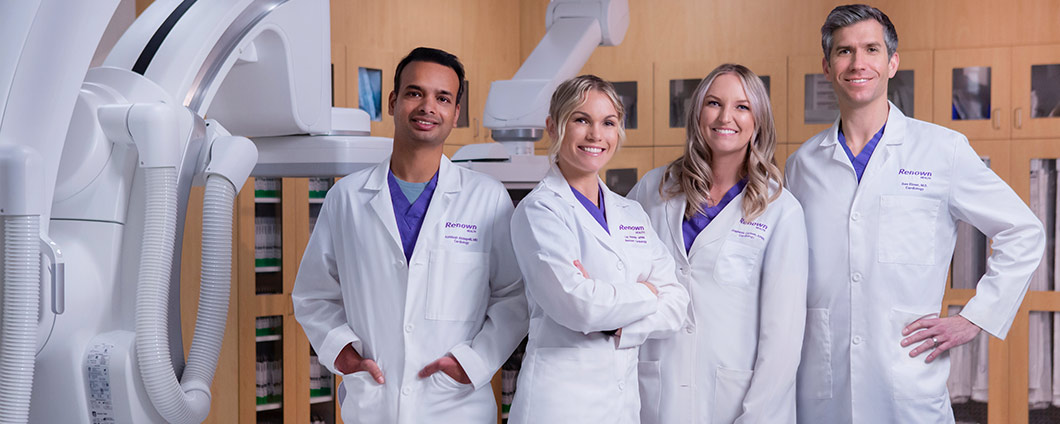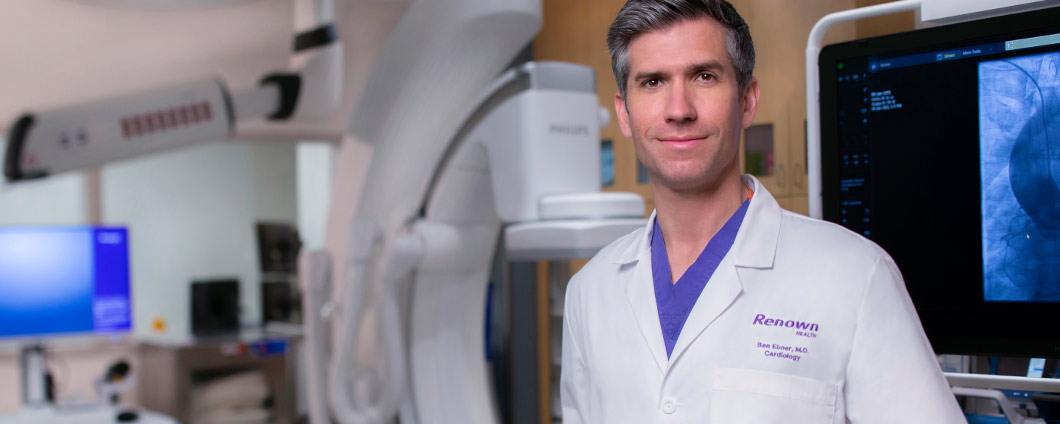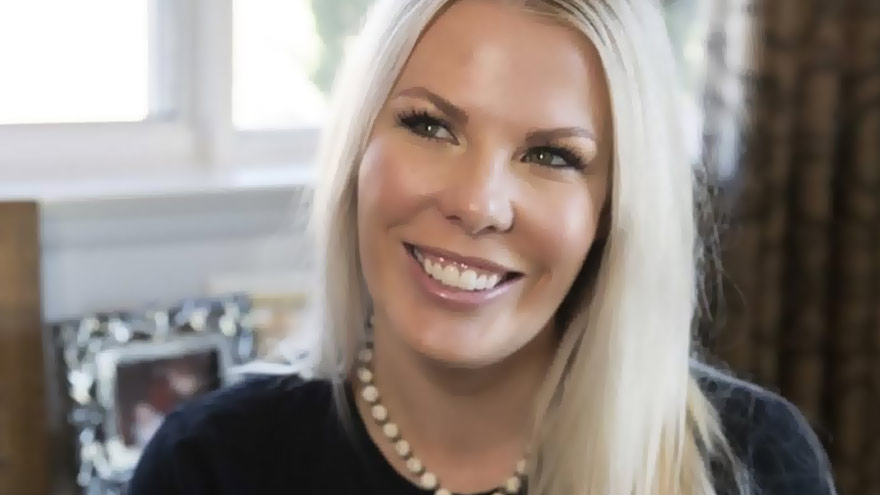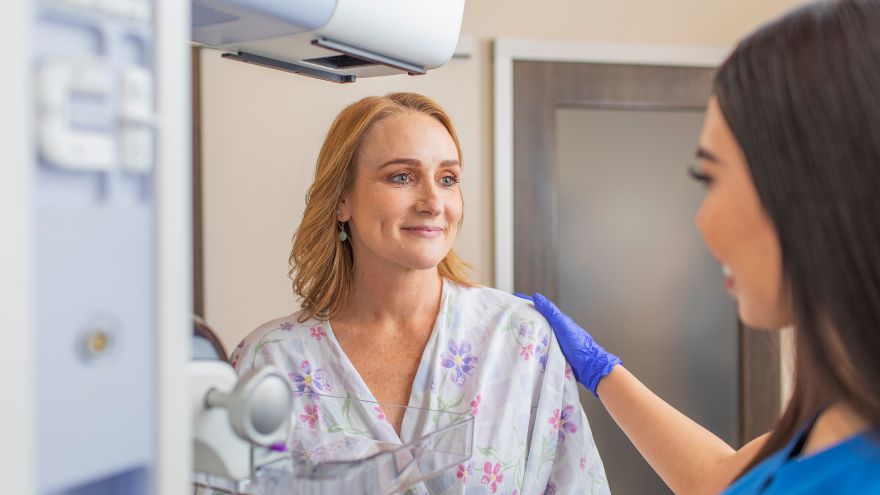Search
Results for 'imaging'
Clear-
Do Mammograms Hurt? 4 Myths Debunked
Mammograms are an effective means for early detection of breast cancer. Still, many women shy away from them for fear of pain or discomfort. Let us debunk a few mammogram myths that will remove your worries and encourage proactive breast health. Reviewed by Dr. Colleen O'Kelly-Priddy, MD, FACS, breast surgical oncologist at Renown Women's Health. Myth 1: Mammograms Are Painful Reality: Although some women experience discomfort during a mammogram, most say it is not painful. Breast compression, which is important to get a clear image, can cause a sensation of pressure, but this lasts for a few seconds. Let your technician know how much pressure you can handle so you're not uncomfortable. Myth 2: Discomfort Persists Long After the Procedure Reality: The sensation of pressure developed through the compression process diminishes quickly after the procedure. Most women go about their day afterward without experiencing any residual pain.
-
Planning Your Care
Planning Your Care at Renown Your care is a team effort, combining the skill and expertise of doctors, nurses, and other support staff who specialize in cancer diagnosis and treatment. This collaboration happens on multiple levels so that you receive the best possible care and treatment specific to your needs. Multidisciplinary Care “Multidisciplinary” refers to the collaboration between providers from different backgrounds or disciplines and can include doctors, advanced practice nurses, registered nurses, therapists, dietitians and social workers. These teams meet regularly to discuss patient care so that each patient benefits from the professional opinion of a wide range of experts. Multispecialty Treatment Depending on your diagnosis, several different specialists may be involved in your treatment. Pathologists study tissue samples in the lab to confirm the diagnosis. Radiologists diagnose and track cancer with various imaging techniques. Medical oncologists treat cancer with chemotherapy and other medications. Radiation oncologists treat cancer with radiation therapy. Surgical oncologists treat cancer through surgery. Medical Geneticists diagnose cancer through genetic counseling. Gynecologic Oncologists treat cancers of the female reproductive system. These specialists meet to discuss your care plan and coordinate to make sure you’re receiving proven evidence-based care. Center of Excellence A Center of Excellence is recognized for having a multidisciplinary, multispecialty team that provides leadership in research, training and best practices. Renown has three Centers of Excellence that focus on site-specific cancers. These include: Breast Cancer Gastrointestinal Cancer (colon, rectum, liver, pancreas, and stomach) Thoracic Cancer (lung and esophagus) These teams regularly meet to develop and update clinical guidelines, identify quality initiatives, evaluate clinical trials, and assess new technology and processes. Cancer Conferences (Tumor Boards) Multidisciplinary, multispecialty cancer conferences (also called tumor boards) allow cancer specialists, genetic specialists, nurse navigators, nurses, social workers, dietitians, physical therapy specialists, and other providers the opportunity to review new and open cancer cases together and provide expertise from several different viewpoints. This collaboration allows them to develop a comprehensive treatment plan for each patient early in diagnosis or changes to a patient’s clinical status. Who is my point of contact? Having multiple doctors who are working with even more doctors can become confusing for patients. Your Nurse Navigator will guide you through your care, provide you with the resources you need and answer your questions. Nurse Navigators
-
Structural Heart Program
The Renown Health Structural Heart Program was the first integrated program of its kind in northern Nevada. Since the beginning, we've been dedicated to providing specialized care to patients with complex and progressive structural heart and valve disease. Our team of experts offer comprehensive diagnostics, advanced treatment options, leading-edge technologies and top-level expertise.
-
Celebrating Resilience: Raquel's Remarkable Journey Through Breast Cancer Treatment
Raquel was 33 when she was diagnosed with breast cancer. It was April 2023, when she found a lump in her breast and was referred to the William N. Pennington Cancer Institute. After comprehensive imaging, she was diagnosed with invasive lobular carcinoma, which is a type of breast cancer that begins in the milk-producing glands of the breast. Between June 2023 and January 2024, she received a total mastectomy, chemotherapy and radiation at Renown Health. “Breast cancer is uncommon in women under 40, but any woman with a mass or lump in her breast should have an exam by a physician and imaging at any age,” said Dr. Lee Schwartzberg. In fact, according to the Centers for Disease Control and Prevention (CDC), only 9% of all new cases of breast cancer in the U.S. are found in women younger than 45. “It was a pretty scary diagnosis, but I’ve been led by great people through the process,” she said. “They were so helpful and there for me throughout the chemo and radiation.” Raquel's journey through breast cancer treatment at the William N. Pennington Cancer Institute was marked by the exceptional care provided by the Renown Health team, including nurses, nurse navigators, therapists, support teams and providers. Among the dedicated professionals, Dr. Michelle Chu and Dr. Lee Schwartzberg played pivotal roles in Raquel's diagnosis and subsequent treatment plan. Their expertise, compassion and commitment to patient care left an indelible impact on Raquel's experience. Their thorough examination and comprehensive approach ensured that Racquel received the best possible care for her invasive lobular carcinoma. In addition to the care provided at Renown, Raquel greatly benefitted from being connected with a mentor by Dr. Chu. This mentor, Kayla, had undergone a similar diagnosis and treatment plan, and at the same age Raquel. They texted and called each other throughout Raquel’s treatment, providing additional support through a challenging time. As of January 2024, Raquel is done with her treatment and continues to see her care team for follow-up appointments. “I’m through the worst and ready to rebuild my life,” Raquel said. To help celebrate this milestone, Nevada Athletics invited Raquel to receive the game ball at a Nevada Men’s Basketball game. She was joined on the basketball court for this special recognition by her husband, Raul; mother, Arlene; and two daughters, Ryleigh and Rhiannon. Racquel's journey is not only a testament to her resilience but also a tribute to the invaluable contributions of Dr. Chu and Dr. Schwartzberg in guiding her towards triumph over breast cancer.
Read More About Celebrating Resilience: Raquel's Remarkable Journey Through Breast Cancer Treatment
-
Update on Elective Surgical Procedures and Medical Services
Today, in accordance with recommendations from the U.S. Surgeon General and the American College of Surgeons, the Renown Health Joint Medical Executive Committee decided that effective Tuesday, March 17, surgical cases scheduled at both Renown Regional Medical Center and Renown South Meadows Medical Center, considered to be ELECTIVE-OPTIONAL will be postponed to a later date. Patients with scheduled ELECTIVE-OPTIONAL surgeries will be called by Renown Health representatives over the next week. Surgeon’s offices will also be reaching out to assist patients with rescheduling their surgeries for a future date. Elective surgeries that are REQUIRED and not optional will be evaluated on a case-by-case basis daily with the surgeon, patient and a medical leadership review committee at Renown. Your surgeon’s office will be in contact with you with more information about these REQUIRED surgeries This temporary measure will allow Renown’s physicians and staff to enact the emergency preparedness plans they have been developing for weeks to create additional capacity for inpatients and to continue to deliver high quality care during the anticipated surge in COVID-19 cases in northern Nevada. The new guidelines do NOT apply to EMERGENCY surgeries performed in Renown hospitals. There are different types of surgery, this decision impacts Elective-Optional surgeries only. Elective – Optional surgery – Elective surgeries are not usually necessary for the individual to stay in good health. They are non-emergency and planned in advance. A wide range of surgeries can be elective. Most cosmetic surgeries are elective. Other surgeries such as organ donation, scoliosis surgery, tonsillectomies and other minor surgeries can also be considered elective. Required surgery – Surgery which needs to be done in order to retain quality of life. As opposed to urgent or emergency surgery, required surgeries do not need to be performed immediately. Examples of required surgery are kidney stone or tumor removal. Urgent or emergency surgery – When a patient’s condition is life threatening, surgery is considered emergent. Emergency surgeries must be performed immediately, even when the patient is unconscious and cannot give consent. Examples include trauma and appendicitis. Life-threatening conditions can occur during labor and delivery which may require emergency surgery. Other services making changes include: Pulmonary Services and Procedures Renown Health today will begin rescheduling patients scheduled for Pulmonary Function Testing, Outpatient bronchoscopy and patients at Thomas S. Dolan Pulmonary Rehabilitation. Patients who are affected by this change are being called by Renown to reschedule their appointments for Monday, April20, 2020 or later. Starbucks at Renown and Renown Dining Options As with many of the Starbucks around the U.S., the Starbucks at Renown Regional Medical Center will shift to a “to-go” model, with no seating available. The cafeterias at Renown Regional Medical Center and South Meadows Medical Center remain open, will temporarily eliminate self-service options and will add more ‘grab and go’ options. Other Renown Services Remain Open Renown Medical Group offices remain open. Planned imaging procedures such as ultrasound, computed tomography (CT), magnetic resonance imaging (MRIs), mammograms and non-invasive cardiology testing will continue at Renown hospitals and office locations and will NOT be postponed at this time. Patients confirmed for imaging appointments will be contacted prior to their scheduled visits to identify those who may be at higher risk of COVID-19 infection. Renown has expanded access to Teladoc virtual visits, available to all Hometown Health and Senior Care Plus subscribers. For up-to-date information on Renown’s approach to keeping our community safe, visit our website at https://www.renown.org/covid-19/. About Renown Health Renown Health is a locally governed and locally owned, not-for-profit integrated healthcare network serving northern Nevada, Lake Tahoe and northeast California. Renown is one of the region’s largest private employers with a workforce of more than 7,000. It comprises three acute care hospitals, a rehabilitation hospital, the area’s most comprehensive medical group and urgent care network, and the region’s largest and only locally owned not-for-profit insurance company, Hometown Health. Renown has a long tradition and commitment to continually improve the care and the health of our community. For more information, visit renown.org.
Read More About Update on Elective Surgical Procedures and Medical Services
-
Participate in a Car Parade at Renown to See New "LOVE" Sculpture
Participants are invited to make noise and cheer as they drive by the sculpture in support of healthcare heroes. Just yesterday, Renown Health announced the iconic “LOVE” sculpture, most recently seen at Burning Man in 2019, was making Renown’s Regional Medical Center’s main entrance its new, temporary home. To help the community experience the artwork, Renown is inviting individuals to parade their cars along the front of its Regional Medical Center campus on Mill St. from 7 – 8 p.m. on Friday, April 17. Across northern Nevada and the country, people are going outside their homes at 7 p.m. to make noise and cheer in support of our healthcare heroes. In a nod to this community and nationwide movement, parade participants are invited to give the “LOVE” sculpture a honk, wave or cheer as they pass by. During the parade, the “LOVE” sculpture will be illuminated in Renown’s signature purple. “In its short time on our campus, this new art installation has already been a powerful source of inspiration for all us here at Renown,” said Tony Slonim, MD, D.Ph., President & CEO, Renown Health. “Love is at the heart of everything our dedicated team of care providers and staff is doing as we fight the good fight to keep our community safe. We are excited for people to experience this exquisite piece of artwork, as well as the positive symbol of resilience, determination and hope that it represents for patients, caregivers and community members.” The installation of the “LOVE” sculpture at Renown was made possible thanks to a longstanding, community partnership with local non-profit, Artown. The organization’s mission is to strengthen Reno’s arts industry, foster its civic identity and enhance its national image, thereby creating a climate for the cultural and economic rebirth of our region. “Artown is extremely honored to be able to provide comfort through our partnership with Renown and this incredible work of art by Laura Kimpton and Jeff Schomberg,” said Artown Executive Director Beth Macmillan. “People passing by the hospital will be warmed and inspired by the art and this one word, LOVE! Now, more than ever, the power of art will provide something beautiful to focus on and restore our confidence.” To ensure vehicular and pedestrian safety, participants of Renown’s car parade are asked to obey posted traffic signage and refrain from stopping in front of the “LOVE” sculpture. People can RSVP on the Facebook Event page: https://www.facebook.com/events/166543557888052/ For more on the “LOVE” sculpture and its impact on Renown’s patients and caregivers, as well as how it’s inspiring a sense of community through the arts, please see this media release. ### About Renown Health Renown Health is a locally governed and locally owned, not-for-profit integrated healthcare network serving northern Nevada, Lake Tahoe and northeast California. Renown is one of the region’s largest private employers with a workforce of more than 7,000. It comprises three acute care hospitals, a rehabilitation hospital, the area’s most comprehensive medical group and urgent care network, and the region’s largest and only locally owned not-for-profit insurance Contact: Renown Public Relations M: 775-691-7308 E: news@renown.org company, Hometown Health. Renown has a long tradition and commitment to continually improve the care and the health of our community. For more information, visit renown.org. About Artown Artown is a non-profit organization whose mission is to strengthen Reno’s arts industry, foster its civic identity and enhance its national image, thereby creating a climate for the cultural and economic rebirth of our region. The month-long summer arts festival features approximately 500 events produced by more than 150 artists, cultural organizations and businesses in locations citywide. For more information, go to artown.org. Media Contact Renown Public Relations M: 775-691-7308 E: news@renown.org
Read More About Participate in a Car Parade at Renown to See New "LOVE" Sculpture
-
Heart Care
We lead the region in cardiology care with our technological expertise and patient-centered approach. Our comprehensive team diagnoses heart disease and other cardiac conditions, offering personalized treatment plans. Plus, our specialty team provides you access to the most advanced medical, surgical and minimally invasive techniques.
-
Alzheimer’s Disease – How to Spot the Signs
Alzheimer’s disease is not normal forgetfulness as we age. Instead, it is a specific form of mental decline. And according to the Alzheimer’s Association it accounts for nearly 80 percent all dementia cases. Natasa Dragicevic, MD, PhD., behavioral neurologist and Alzheimer’s disease specialist with Renown Institute for Neurosciences, weighs in on diagnosing it and the importance of early medical action. How to Diagnose Alzheimer’s Disease In general, the signs of Alzheimer’s disease occur slowly, getting worse over time. For example, forgetfulness is a daily search – for shoes, keys and other misplaced items. Not only is memory affected, but also speech patterns and behavior. There is no single test for Alzheimer’s disease. “Specifically, a neurologist should be the one to diagnose Alzheimer’s disease given differences in presentation,” clarifies Dr. Dragicevic. “And ideally a behavioral neurologist (Alzheimer’s sub-specialist) will be managing the treatment,” she adds. Brain Imaging Diagnosing Alzheimer’s disease involves multiple approaches and medical providers. In short, medical history is reviewed along with a physical exam, lab tests and other diagnostic testing. “A medical workup includes a variety of tests. These include MRI and other brain imaging, as well as neurological and psychological testing. Furthermore, a lumbar puncture is performed to look for markers of the disease,” she states. What Causes Alzheimer’s disease? Although no one knows the cause, researchers think many factors play a role. Uncontrollable risk factors include your genetics and having a family member with the disease. However, the controllable risk factors include: reducing the risk of head injury and keeping your heart healthy. It’s important to realize that high blood pressure, high cholesterol, stroke and diabetes play a role in brain health. Blood loss to the brain causes vascular dementia, leading to long-term blood vessel damage. Symptoms of Alzheimer’s disease Generally speaking, the signs of this disease differ in each person. Yet noticeable behaviors include: • Losing the way to familiar places • Forgetting to pay bills • Trouble finding the right words when talking • Repeating questions • General confusion • Social withdrawal Alzheimer’s Disease – Benefits of Early Diagnosis Equally important, spotting Alzheimer’s disease early allows more time to benefit from medications and possible clinical trials. Likewise, nutrition and exercise changes can be made, increasing blood flow to the body, and perhaps delaying symptoms. Early diagnosis also allows for personal health decisions and quality-of-life conversations to take place. According to the Alzheimer’s Association, these benefits include: 1. Medical advantage 2. Emotional and social comfort 3. Time to plan ahead 4. Cost savings A Brain Supporting Lifestyle “At the present time, treatment is limited,” explains Dr. Dragicevic. “Usually Alzheimer’s is a progressive ongoing disease – any management at this time is purely symptomatic.” However, she states the following lifestyle changes can help support brain health: • New hobbies such as painting, pottery, music classes or learning a new language • Crosswords, puzzles and playing games, such as Scrabble • Brain challenging mobile apps, such as Luminosity • 30-45 minutes of mild to moderate physical activity per day, such as walking • Eating a Mediterranean diet (primarily plant based foods)
-
Woman With Family History of Cancer Taking Action Today
With a family history of breast and other cancer, Aime′ Landaburu isn’t missing a single health screening. She recently had her first mammogram as well as a whole breast ultrasound, which detects 41 percent more cancers and reduces the number of false-positive results. Like many people, Aime′ Landaburu is busy juggling parenthood and a career. It would be easy to put health screenings on the back burner, but with a grandmother who has survived breast cancer three times and a grandmother who had ovarian cancer, Landaburu is addressing her family health history head-on. “I decided at 35 that I needed to get my screenings done because I have my family history of both grandmothers having had cancer,” Landaburu says. “In addition to the mammogram, I was really interested in doing the whole breast ultrasound. It is the same price as getting my hair done and it’s potentially something that could save my life.” Landaburu says the procedures were painless. “It was really comfortable, and the techs were all so nice and kind and gentle and explained things along the way.” Breast Screening Technology Provides Greater Insight George Krakora, MD, lead radiologist for Renown’s Breast Health Center, says the new 3D imaging for mammograms is picking up subtle cancers that would not have been seen with the previous 2D imaging. “It’s an additional tool that helps find those subtle cancers that may be missed in dense breasts,” Dr. Krakora says. With the whole breast ultrasound, the tech screens for masses — which are often obscured on the mammogram X-ray. Studies show it detects an additional 2 to 3 cancers per 1,000 women that would not have been detected with routine mammography. “Aime′ was noted to have heterogeneous dense breast tissue. That puts her at a little higher risk for cancer and also limits the sensitivity of mammography,” Dr. Krakora says. Multiple Ways to Screen for Breast Cancer However, Dr. Krakora notes, breast ultrasound is not a substitute for mammography, which can detect calcifications that can represent the earliest forms of cancer.” Surprisingly to Landaburu, her results came in just three days. “It’s so important to know what’s going on in your body. I was really nervous when I first got the paperwork, but ultimately it was negative, “ Landaburu says. “I’m thankful it was good and I have a baseline for the future.” Landaburu also advises other young women with a history of breast cancer to proactively communicate. She says it’s important to reach out to women they know who have survived breast cancer. “You have to take the first step and you want to be around for your kids and your family and yourself,” she says. “So utilize your resources, educate yourself and go get screened.” Breast Cancer Screening and Prevention Breast cancer begins when abnormal cells in the breast grow out of control. These cells form tumors that can grow into the surrounding tissue and spread to other parts of the body. Breast cancer occurs mostly in women, but men can also develop breast cancer. To schedule a mammogram or whole breast ultrasound, call 775-982-8100, or schedule an appointment online. Make an Appointment
Read More About Woman With Family History of Cancer Taking Action Today
-
Lung Cancer Screening and Early Detection
Lung cancer is the leading cause of cancer deaths in both men and women in the U.S. The good news is the five-year survival rate increases dramatically if lung cancer is treated before spreading to other parts of the body. Julie Locken, MD, of Renown Health Imaging, explains more. What are the signs and symptoms of lung cancer? As you might expect, most lung cancer symptoms appear in the chest and can affect your breathing. Watch for signs such as: Persistent cough Constant chest pain Shortness of breath Wheezing Bloody or rust-colored phlegm Hoarseness Swelling of the neck Pain or weakness in the shoulder, arm or hand Recurring pneumonia, bronchitis or other lung infections Loss of appetite and loss of weight can also be signs of lung cancer That said, there are usually no symptoms in the early stages of lung cancer, which means getting screened can truly be a lifesaver. If you have a history of smoking, you should get screened as a precaution. What are the risk factors of lung cancer? Around 80% of lung cancer cases stem from a history of smoking tobacco. But there are other known causes, such as secondhand smoke, radon, asbestos and diesel exhaust. It’s important to do what you can to eliminate exposure to all of these to reduce your lung cancer risk. People with an immediate relative – a parent, sibling or child – diagnosed with lung cancer and people between 50 and 80 years old are also at higher risk and may need to consider screening. People who are at the highest risk are those with a history of smoking tobacco, particularly smokers who averaged one pack of cigarettes per day for 20 years or more, as well as former heavy smokers who quit in the last 15 years.
-
Why Mammograms Are Vital for Early Breast Cancer Detection | Renown Health
Breast cancer affects 1 in 8 women in the U.S. each year, making early detection crucial in improving the chances of successful treatment. Early Detection for Treatment and Peace of Mind Mammograms are noninvasive X-rays used to detect cancer and other abnormalities in the breast. They are the most effective screening tool for detecting breast cancer early, allowing for timely treatment before the disease can spread and helping to improve treatment outcomes. To help guide you through the mammogram process, we spoke with Elizabeth Kang, PA-C, at Renown Breast Surgery Care to equip you with expert knowledge on what to expect and why screening is so important. How Accurate are Mammograms? 3-D mammography technology at Renown Breast Health Center can detect 41% more cancers and reduce the number of false-positive results compared to plain film mammography. Benefits of 3-D mammography include: Providing better, clearer images, with higher diagnostic accuracy Allowing radiologists to see more abnormalities in the breast Helping doctors spot more cancers and avoid false positives, especially if you have dense breast tissue Reduced callback rates for findings on screening Mammogram Screening and Breast Exam Recommendations Renown Women's Health recommends the following breast exam guidelines: Age 18-39: Consult your primary care provider for a Risk Assessment and start breast exams at age 25. Age 40+: Get your annual mammograms. Family history: Begin screening 10 years before your youngest family member's age at diagnosis. For example, start at age 35 if a family member was diagnosed at 45. Self-awareness: Be familiar with the look and feel of your breasts and report any changes to your care provider. Age 75+: Continue annual mammograms if life expectancy exceeds five to seven years. What screenings are available for women with breast implants? Women with breast implants can and should still receive mammograms, and it’s essential to have these screenings done by an experienced team. Be sure to inform your healthcare provider and mammogram technicians about your implants, as they may recommend special techniques or steps to detect abnormalities and ensure accurate results.
Read More About Why Mammograms Are Vital for Early Breast Cancer Detection | Renown Health








